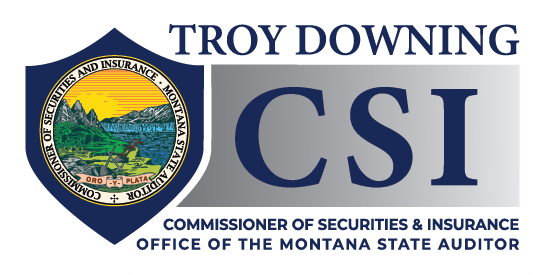By Commissioner Troy Downing
Are social media denizens tricking you into making bad investment decisions where you lose, and they win?
Social media influencers aren’t just dancing on TikTok or recording themselves playing video games. The rise of the unlicensed online “expert” sharing tips on investing, trading cryptocurrency, or how to get rich quick is changing the way many people invest. These schemes are growing at an alarming rate making it difficult to protect consumers.
As the economy shutters and real wages continue to fall, many are looking for new ways to keep up with inflation by finding new revenue sources. The financial influencer – or “finfluencer” – takes advantage of this reality by posting viral videos to millions of fans, attempting to get individuals to invest in their product or strategy.
Finfluencers come in two forms: The first is the internet personality or celebrity who is paid to post sponsored content on social media. The second is the self-proclaimed expert selling their own products, financial training, or investment secrets. Both types of finfluencer generate trust with their audience through fame and notoriety with claims of little risk and high reward. Think about it – should Matt Damon be relied on to understand Bitcoin or should Kim Kardashian be considered the expert in turning real money into cryptocurrency?
Kim Kardashian, who has more Instagram followers than the total population of the United States, recently paid $1.26 million in fines for touting a cryptocurrency asset and failing to disclose she was paid to promote the content. Kardashian is not alone. Steven Seagal and Floyd Mayweather have been fined for similar breaches.
Celebrities with massive followings are generally easy for regulators to police. The violations they commit are usually minor, and they rarely scam fans directly. Unfortunately, the same cannot be said for the self-described expert providing unlicensed investment and financial advice. This type of finfluencer will claim expertise or invention of a full-proof strategy with high rewards and little risk, boasting massive profits with screenshots of their bank account or glimpses into lavish lifestyles.
The proliferation of the finfluencer makes it nearly impossible for regulators to monitor the huge amount of investment material shared on social media. Investors should learn to identify red flags.
Start with investing basics:
- Every investment carries risk, and there is no magic or secret to get rich overnight. Most “overnight successes” take years of discipline to achieve. Ask yourself, “if a finfluencer claims to have made millions of dollars using their secret investment strategy, why are they spending more time trying to get me to buy their strategy?” If it sounds too good to be true, it likely is.
- Never take unsolicited investment advice.State and federal laws require securities brokers, advisers, firms, and the products they sell to be registered or licensed. Investments still carry risk, but a licensed professional is better equipped to help you understand the risks – especially the non-obvious ones.
- Do your homework before investing.If you work with a finfluencer, ask for references, research their social media pages and website, and read the posted comments on their pages. If they’re consistently deleting old content on their social media pages, it could mean they’re erasing negative comments or reposting old content to appear as new. But still – approach with skepticism and caution. Most of these “opportunities” don’t pan out and significant amounts of money may be lost.
The rise of the finfluencer opens the door to new investment opportunities, but it’s not without risk. If you have questions about investing or know of a finfluencer scamming people online, contact our agency at 406-444-2040 or go to CSIMT.gov.
Was this helpful?
Please give us your feedback!
Please let us know how we could improve this article.
